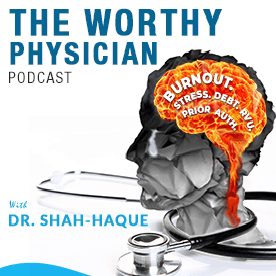Detached Attachment
In the most recent episode, Dr. Yolanda Bogaert sat down with me to discuss her journey through burnout/moral injury. What stuck out to me was when she mentioned meeting the patient where the patient was. I think many times we forget to connect with patients, and others, on a human level. It’s easy to be in our heads, and not fully within the moment or experience.
It is easy to always be looking at the clock. I have them strategically placed in my exam rooms to try and help keep me on time. But there are times when I wish time could stand still. I went into medicine to leave this world a little better than I found it. I wanted to study the human body, the most amazingly engineered entity! I believe we all care about our patients, BUT, we cannot care more about the outcomes than the patients.
The second thing that struck me as brilliant with Yolanda was her mention of detached attachment! This concept completely blew my mind! Be detached from the outcome.
I think this gave me the freedom to love what I do, but not take responsibility for a choice that is not mine. At the end of the day, it is the patient’s choice to follow medical advice or not. I, also a patient, have had my moments of not following medical advice. I remember in medical school that I didn’t take a prescription for what was really grief and not depression. Instead, I talked to the family priest about a personal loss. Physicians are humans. Patients are humans. The medical education system tries its best to teach the social determinants of health along with pathophysiology. However, there is no possible way to figure out the situational and physiologic/psychologic complexity of every patient and every situation. Detached attachment really resonated with me because it gives me the freedom to give medical advice and the patient their autonomy to choose as they will.
“Detachment is not giving up the things in this world but accepting the fact and to be continuously aware that nothing is permanent.” Aditya Ajmera
Yolanda Bogaert, a physician for over 26 years and a nephrologist for more than 20, faced a pivotal health crisis after being diagnosed with active, debilitating multiple sclerosis. Striving to embody the “god-like” doctor who could fix every patient, she nearly left clinical medicine entirely. But after deep reflection, countless courses, and therapy, she developed a groundbreaking approach to patient-physician relationships known as the "detached-attachment model." Paired with efficient, stress-reducing techniques to enhance patient flow, this approach helped her reduce burnout and continue practicing for six more years.
Now, as the founder of Frame Shift Coaching, Yolanda empowers clinical healthcare professionals facing burnout, sharing the transformative strategies and models that allowed her to overcome her own challenges.


